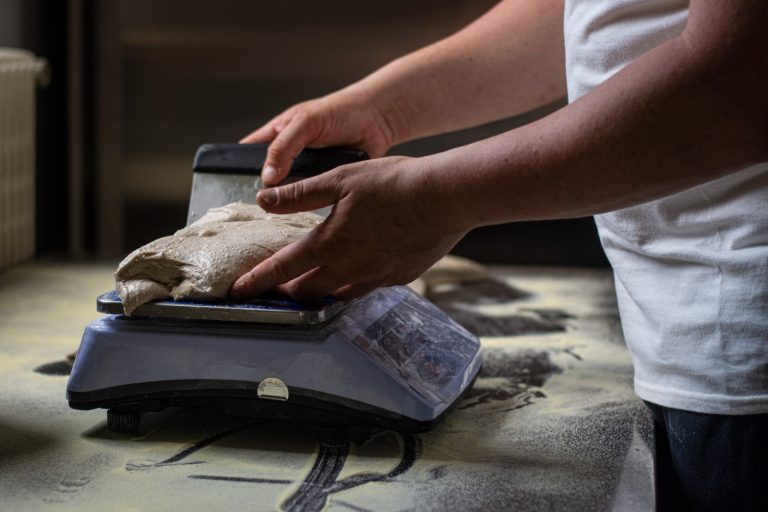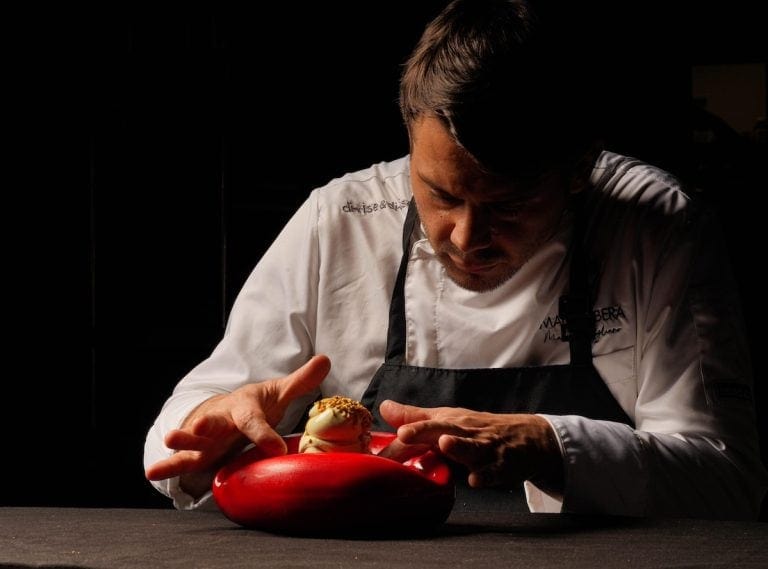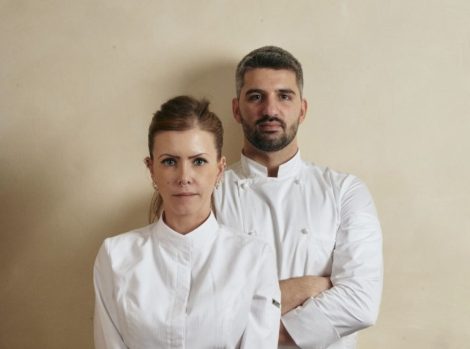The fermented beverage, produced from tea, is now an international superstar. In Italy, it also finds fertile ground in the pizza universe. In gourmet pizzerias, we pair it with round pies, while the most avant-garde pizzaiolos use it to ferment vegetables. Now is the time to see it in action in the dough.
Inspiration can be sought everywhere: for Michele Colpo, a talented 34-year-old pizza maker at the award-winning Pizza Factory in Bassano del Grappa, it came from admiration for the work of a chef, almost the same age, Oliver Piras, who has been involved in fermentations for a long time. Piras, a Sardinian with a global background - he is at the helm of Carpaccio in Paris with Alessandra Del Favero - has honed his talent in some of the greatest establishments on the planet (notably El Celler de Can Roca in Girona and Noma in Copenhagen, which has a dedicated fermentation laboratory). The adventure with kombucha at the Premiata Fabbrica Pizza (Award-Winning Pizza Factory) begins like this: “Fascinated by Piras's kombucha, we started producing the beverage and experimenting with it, both in the doughs and in the fermentation of foods,” the pizza maker explains.
Who is Michele Colpo?
With a background in the kitchen, Colpo worked for years in a pizzeria on weekends. Then, in 2015, a turning point: he attended the Pizza University of Molino Quaglia and later landed in Bassano, under the guidance of Massimo Frighetto, an entrepreneur, selector, sommelier, and chef, just a few steps from the famous Old Bridge over the Brenta River. The establishment spans three levels, with the lower level housing the laboratory where the doughs come to life (the term is not casual). Everything in this kitchen is self-produced, and kombucha is also used to ferment fruits and vegetables, which later become the toppings for the pizzas.
A native of Vicenza and a nature and mountain enthusiast, the pizza maker is highly focused on spontaneous fermentations—those based on organisms already present on the food or in the environment—and on reducing waste in the kitchen. From this perspective, fermentations, in general, are a boon because they allow the valorization of what traditionally (and mistakenly) was considered waste. Regarding the doughs, the pizza maker has been dedicated to working with sourdough and whole-grain flours from the beginning. Then, over time, the desire to learn and experiment takes over, and growth materializes "through study and research in various specific texts and discussions with Masters such as Simone Padoan, Renato Bosco, and chef Alessandro Dal Degan."
The proposal from the Premiata Fabbrica Pizza
Featuring local products, food waste recovery, and attention to vegetarians and vegans, the menu of the Premiata Fabbrica Pizza is full of interesting ideas (and well-explained, as it provides numerous details about the steps that make up the chosen pizza through an infographic). Michele describes it as "simply good and contemporary pizza." He manages various doughs in the establishment: the so-called Napoli (type 0 flour and beer yeast biga), the Contemporary (live sourdough, stone-ground whole and semi-whole flours, with high hydration), and the dough without added yeast (spontaneous fermentation with semi-whole flours).
Kombucha in Pizza
In the dough with spontaneous fermentation, kombucha comes into play, used as a starter to initiate fermentations, both in pizza and bread, produced by Colpo in the laboratory. When using kombucha, a specific result and a particular aromatic profile are sought, "it gives a distinctive fragrance to the crumb, especially providing crispiness and friability." The dough with kombucha, here at the Award-Winning Pizza Factory, is composed of a mix of flours (soft wheat, spelt, semolina), with a pre-dough at 50% hydration, which ferments for about 20 hours, and then a final dough at 72% hydration.
Pizza with kombucha (without added yeast): the recipe
Fermentation
- 1.5 kg of type 1 flour
- 500 g of semolina
- 600 g of whole farro flour
- 1 kg of water
- 300 g of kombucha
Mix all the flours with water and kombucha to obtain a rough dough like a biga. Let it ferment for 18/20 hours at 22°C.
Dough
- 500 g of type 1 flour
- 500 g of whole farro flour
- 350 g of organic flour 280 w
- 3.9 kg of fermentation
- 1.2 kg of water
- 300 g of kombucha
- 120 g of extra virgin olive oil
- 80 g of salt
Mix all the flours with the fermentation and proceed with water and kombucha in small quantities until obtaining a smooth and well-structured dough. Conclude the dough by adding salt and oil (ideal exit temperature 26/28°C).Transfer the dough to a container and let it bulk ferment for 2 hours at 26/28°C. Proceed with shaping the 250g dough balls. Allow the balls to rise for about 3 hours at 28°C, then transfer them to the refrigerator at 3°C.
When ready, proceed with rolling out the dough on the surface with durum wheat semolina. Bake in the oven at 350°/360°C for 3/4 minutes.
Premiata Fabbrica Pizza - via Angarano, 5 - Bassano del Grappa (VI) - www.premiatafabbricapizza.it


 Farewell cacio e pepe in New York. "With tariffs, Pecorino Romano will also become more expensive." The warning from Giuseppe Di Martino
Farewell cacio e pepe in New York. "With tariffs, Pecorino Romano will also become more expensive." The warning from Giuseppe Di Martino Against tariffs? Here are the US foods that could be "hit"
Against tariffs? Here are the US foods that could be "hit" US tariffs: here are the Italian wines most at risk, from Pinot Grigio to Chianti Classico
US tariffs: here are the Italian wines most at risk, from Pinot Grigio to Chianti Classico "With U.S. tariffs, buffalo mozzarella will cost almost double. We're ruined." The outburst of an Italian chef in Miami
"With U.S. tariffs, buffalo mozzarella will cost almost double. We're ruined." The outburst of an Italian chef in Miami "With US tariffs, extremely high risk for Italian wine: strike deals with buyers immediately to absorb extra costs." UIV’s proposal
"With US tariffs, extremely high risk for Italian wine: strike deals with buyers immediately to absorb extra costs." UIV’s proposal






